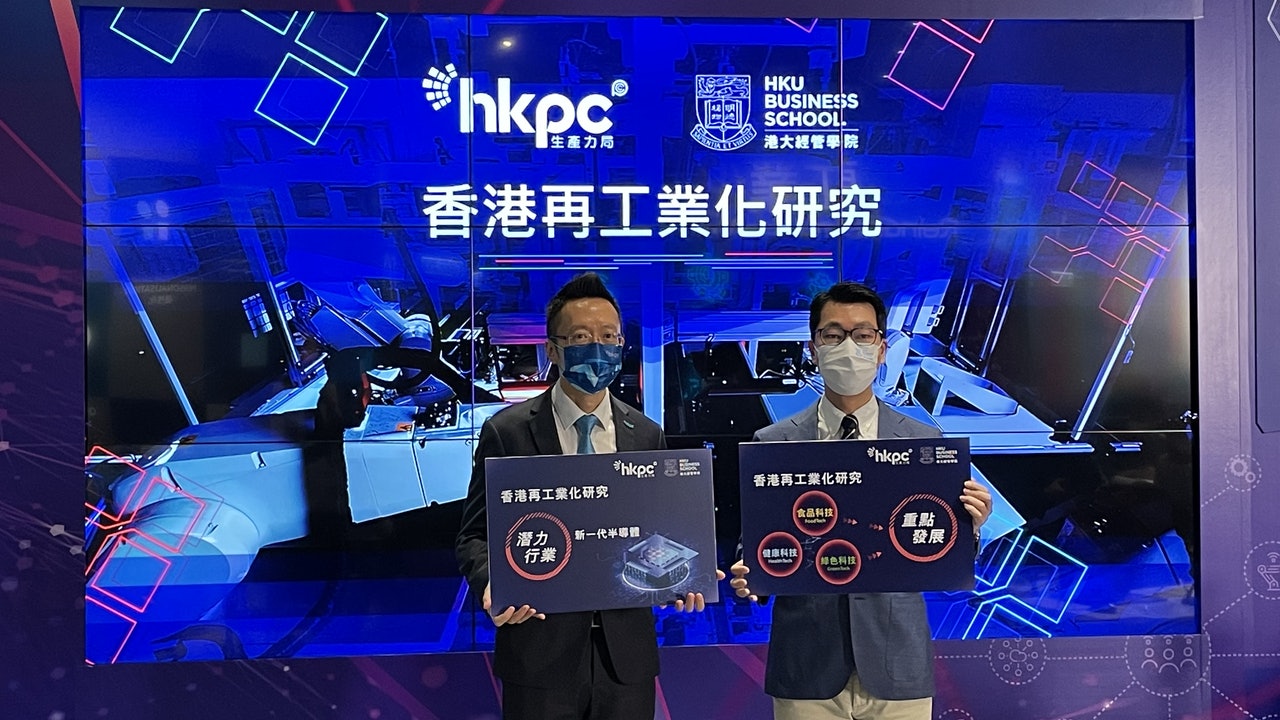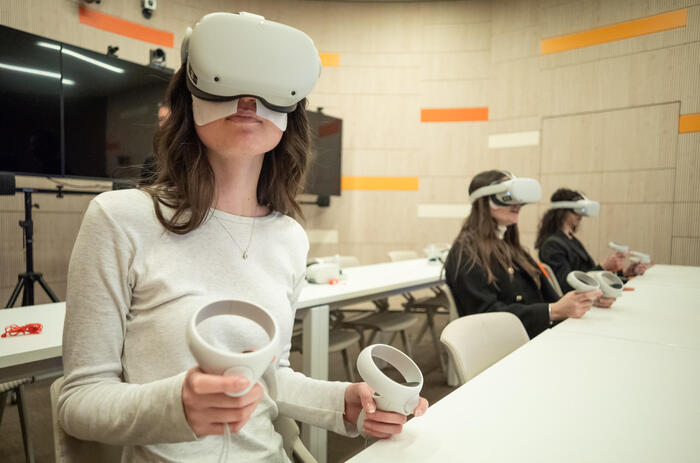Chief Executive Carrie Lam Cheng Yuet-ngor, in his last "policy address" in this term, stated on several occasions that Hong Kong would "re-industrialize."
The Hong Kong Productivity Council today (8th) announced the "Re-industrialization Research in Hong Kong". 58% of the interviewed food technology, health technology and green technology companies stated that they have invested in the research and development of Industry 4.0, but most of them are faced with insufficient space for the establishment of automated production lines. Challenges, and only 28% of companies expect that in the next one to two years they are confident that they can find suitable talents to engage in industry 4.0 related work.
Li Shaobin (left), Chief Digital Officer of HKPC, said that if they can learn more about the advantages and feasibility of developing Industry 4.0 technology and intelligent manufacturing, I believe it will enhance their confidence and support in considering upgrading and transforming enterprises.
(Photo by Yun Jiajin)
Industry 4.0 focuses on connectivity, automation, machine learning, and real-time data. At the same time, it integrates actual production operations with smart digital technology, machine learning, and big data.
The Productivity Council and the School of Economics and Management of the University of Hong Kong conducted the "Re-industrialization Research in Hong Kong" from July to September. During this period, 184 local companies were interviewed with questionnaires. Among them, the research focused on three industries with more potential in Hong Kong: food technology, health technology and green technology.
The survey results show that 58% of the companies surveyed said they have invested in R&D of Industry 4.0, broken down by industry, 79% of food technology, 65% of health technology and 36% of green technology companies said they would invest in R&D; 73% of food technology, 50% Health technology and 75% of green technology companies surveyed indicated that they have conducted R&D activities in Hong Kong.
Most companies claim that there is no room to build automated production lines. 40% means that 10,000 square feet of plant area is enough.
At the same time, more than half of local food, health and green technology companies believe that the primary advantage of developing "Industry 4.0" is to increase productivity, and 52% of the companies surveyed have plans to relocate or expand their production processes to Hong Kong.
However, the main challenges include not enough space to establish automated production lines, insufficient unloading space and low ceilings. About 40% believe that 10,000 square feet or less is sufficient, but most of them face the challenge of not having enough space to build automated production lines. .
Only 28% of companies expect to find suitable talent in one to two years
In addition, only 28% of companies expect the next one to two years, 33% expect the next three to four years, and 37% expect the next five years to be confident that they can find suitable talents for Industry 4.0 related work.
Dr. Tang Xiwei (right), Professor of Economics at the School of Economics and Management of the University of Hong Kong, said that the research in this report hopes to study the specific policies adopted by other governments to promote the development of advanced manufacturing through technology and innovation activities.
(Photo by Yun Jiajin)
Productivity Council: Hong Kong's newly completed manufacturing center and industrial buildings meet the area requirements of enterprises
Li Shaobin, Chief Digital Officer of the Productivity Council, explained that knowing about half of the industry 4.0 companies, if you don't know the reindustrial companies, you can learn more about the advantages and feasibility of technology and smart manufacturing, I believe it will enhance their confidence and support in considering upgrading and transforming for the company.
Studies have shown that about 30-40% of enterprises believe that the factory area of 10,000 square feet or less is sufficient, and Hong Kong's newly completed advanced manufacturing center and existing industrial buildings can also meet the demand for factory area.
The research report recommends that food technology companies upgrade food production to "plant meat" production and R&D; health technology companies can optimize Chinese and Western medicine production to expand vaccine production and life sciences; green technology uses technology to reduce area demand, such as "food waste regeneration man" .
The new generation of semiconductors is a potential industry for re-industrialization. Hong Kong is calling for a chip design center
Li pointed out that the University of Hong Kong has also invited many large local companies to conduct focus group discussions and found that many companies believe that the "new generation of semiconductors" is an emerging industry with great potential for "re-industrialization."
Hong Kong can target the market’s demand for third-generation semiconductors, such as establishing a chip design center to attract semiconductor-related companies from all over the world to settle in Hong Kong.
The semiconductor industry was a traditional industry in Hong Kong in the 1980s and 1990s. Local OEMs provided important components for world-renowned brands. The "Made in Hong Kong" brand is a guarantee of confidence; attracting semiconductor manufacturers to set up factories in Hong Kong is conducive to the development of "re-industrialization".
Consumer vouchers|The HKPC provides 50 fund information. Small and medium-sized enterprises hope to finance digital transformation. HKPC survey: 60% of employers intend to use a long-term mixed office model. Scholars advocate the "322" model to increase cyber risks during the epidemic. Responding to attacks
01News






/cloudfront-eu-central-1.images.arcpublishing.com/prisa/WWFMH3RJQFHGDLP4L4JLWOGC6Y.jpg)
